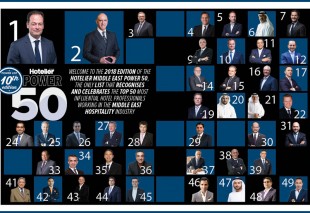

Power moves: Hotelier Middle East annual Power 50 2018 list REVEALED!

Welcome to the 10th annual Hotelier Middle East Power List. Over the last year, not to mention the last decade, the hospitality industry has certainly kept us busy with this endeavour. The hard work has paid off though; today, the Power List is considered the definitive ranking of the region’s hospitality players.
A lot has changed during this time. Where once Dubai was a beacon of untapped potential, today, hotel groups are grappling with the challenges of operating in a competitive market and rocking investor confidence — as evidenced by the spate of reflaggings in the last year. If 2017 was the year of acquisitions, 2018 has definitely been the year of multiple high-profile reflaggings.
That’s not to say that hoteliers have given up on Dubai. Most are up to the challenge of meeting the nuanced needs of a maturing market. Every year, the number of mid-market hotels continue to grow, and it’s a trend we don’t see abating any time soon, especially with Expo 2020 only two years away.
But the competitive playing field has also led hotel groups to look elsewhere. Saudi Arabia is the top of everyone’s list, by the sounds of it. InterContinental Hotels Group has signed an MDA to operate 15 new Holiday Inn Express hotels in the kingdom; Hilton’s Saudi Arabia portfolio accounts for more than a third of the group’s inventory and nearly half of the group’s pipeline hotels. And it’s not just the main Saudi markets of Jeddah, Riyadh and the holy cities of Makkah and Madinah.
Hoteliers are swiftly signing properties in smaller markets such as Tabuk, Hofuf, and Neom.
Operators are also expanding their presence in previously ignored markets such as Jordan and the Levant region.
Talent development is another key area of focus hoteliers have highlighted in their entries this year. As operational numbers grow, hoteliers are investing in developing the local talent pool within the countries in which they operate.
Millennium Hotels & Resorts, for instance, will be doubling its employee numbers by 2020, and aims to employ more GCC nationals within its hotels. Emaar launched The World’s Greatest Hospitality Talent — a fun spin on recruitment and employee development.
Given all these exciting developments, it was certainly a challenge for Hotelier Middle East’s editorial team to rank this year’s power list. As always, the Power 50 is a subjective ranking, but it’s also grounded in facts and data.
As with previous years, the team used an algorithm developed in-house, wherein data such as numbers of operating hotels and pipeline figures were collected. Once the data was collected, it was placed into a formula that assigns weights and values to all the criteria. This gave us a preliminary ranking to work on, and editorial discretion was used based on information provided as well as our knowledge of the industry to create a ranking that we could justify after a lot of debate and discussion.
Seventeen new hoteliers have joined this year’s list. Some have replaced former colleagues, while a few new hotel groups are making their debut in 2018.
AccorHotels has earned its well-deserved spot at the top of the list. CEO Olivier Granet has led the operator through a period of rapid growth, tripling the group’s portfolio to 160 operational hotels in the region, with another 115 in the pipeline.
You can watch our video interviews with some of the top 50 hoteliers on our YouTube channel or the dedicated Power 50 microsite.
As always, if you have any suggestions about the Power 50, please get in touch with the editorial team.
Thank you for all your support.